|
|
|
Sort Order |
|
|
|
Items / Page
|
|
|
|
|
|
|
| Srl | Item |
| 1 |
ID:
130956


|
|
|
|
|
| Publication |
2014.
|
| Summary/Abstract |
In July 2013 the UK's coalition government published "The Civil Service Reform Plan - One Year on", reporting on progress against minister Frances Maude's objectives to shake up the civil service. This followed various reported disagreements between ministers and civil servants over policy implementation, and a research report commissioned by the government from think tank IPPR into lessons from overseas for civil service reform. This trio of short articles reviews the government's proposals from three perspectives: that of the lead author of the IPPR report, a former senior civil servant, and the chair of the House of Commons Public Administration Committee (PASC) which oversees the civil service. The authors take differing views on the proposals, which include introduction of 'extended ministerial offices', and greater control by ministers over choosing their civil servants. Should these be seen as useful next steps, worrying developments, and/or large and important enough to merit a Commission on the civil service, as PASC has suggested?
|
|
|
|
|
|
|
|
|
|
|
|
|
|
|
|
| 2 |
ID:
151030
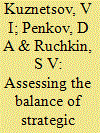

|
|
|
|
|
| Summary/Abstract |
The paper elucidates basic theoretical points of the functional approach to estimate the correlation between strategic forces of sides in a multipolar world, and specifies the theoretical base of this functional approach with a view to further using the latter in the interests of addressing a broader range of applied problems. It reviews categories of strategic forces balance in coalitions, formulates the concept of the extent of unacceptable damage for opposing coalitions, and substantiates the potential of using the functional approach to tackle direct and inverse problems related to the assessment of strategic forces in coalitions.
|
|
|
|
|
|
|
|
|
|
|
|
|
|
|
|
| 3 |
ID:
139280
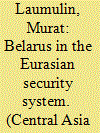

|
|
|
|
|
| Summary/Abstract |
The Republic of Belarus occupies the western periphery of geopolitical Eurasia, by which I mean the post-Soviet space, and is fairly far removed from Central Asia. This distance, however, does not mean that Belarus is safely protected from the security threats emanating from the Central Asian region, and, on the whole, Inner Eurasia. The Belarusian expert community is not indifferent to these problems. Belarus has preserved its military and strategic importance for Russia within the categories of European confrontation of the previous period. Today, it is consistently and actively involved in military integration within the CSTO. The armed forces of Russia and Belarus are tied together by the so-called coalition approach. Civilian and military experts of the Republic of Belarus are studying the hypothetical possibility of its involvement, at the technical level, in the Collective Rapid Reaction Force of the CSTO if and when NATO pullout of Afghanistan sends waves of instability across Central Asia.
|
|
|
|
|
|
|
|
|
|
|
|
|
|
|
|
| 4 |
ID:
125764
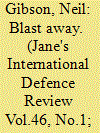

|
|
|
|
|
| Publication |
2013.
|
| Summary/Abstract |
The recent asymmetric conflicts in Afghanistan and Iraq have shown that buried improvised explosive devices (IEDs) are a preferred method to attack the numerically and technically superior allied armoured forces.
|
|
|
|
|
|
|
|
|
|
|
|
|
|
|
|
| 5 |
ID:
138905
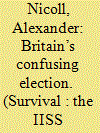

|
|
|
|
|
| Summary/Abstract |
Were it to be a straightforward ‘economy, stupid’ contest, the Conservative Party, led by Prime Minister David Cameron, might be expected to triumph in Britain’s 7 May 2015 general election. The government that took office in 2010, a coalition between the Conservatives and the third-placed Liberal Democrats, inherited a large budget deficit and a steep recession that had
begun with the 2008 financial crisis.
|
|
|
|
|
|
|
|
|
|
|
|
|
|
|
|
| 6 |
ID:
111653
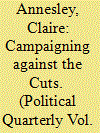

|
|
|
|
|
| Publication |
2012.
|
| Summary/Abstract |
The Coalition's economic strategy poses a significant threat to gender equality in the UK. In the absence of committed gender equality advocates in the government, campaigning is, again, from the outside. This article presents some of the new strategies developed by individuals and organisations such as the Women's Budget Group and the Fawcett Society to fight against the cuts and considers the effectiveness of their approaches.
|
|
|
|
|
|
|
|
|
|
|
|
|
|
|
|
| 7 |
ID:
130955
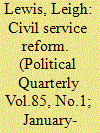

|
|
|
|
|
| Publication |
2014.
|
| Summary/Abstract |
In July 2013 the UK's coalition government published "The Civil Service Reform Plan - One Year on", reporting on progress against minister Frances Maude's objectives to shake up the civil service. This followed various reported disagreements between ministers and civil servants over policy implementation, and a research report commissioned by the government from think tank IPPR into lessons from overseas for civil service reform. This trio of short articles reviews the government's proposals from three perspectives: that of the lead author of the IPPR report, a former senior civil servant, and the chair of the House of Commons Public Administration Committee (PASC) which oversees the civil service. The authors take differing views on the proposals, which include introduction of 'extended ministerial offices', and greater control by ministers over choosing their civil servants. Should these be seen as useful next steps, worrying developments, and/or large and important enough to merit a Commission on the civil service, as PASC has suggested?
|
|
|
|
|
|
|
|
|
|
|
|
|
|
|
|
| 8 |
ID:
130954
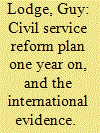

|
|
|
|
|
| Publication |
2014.
|
| Summary/Abstract |
In July 2013 the UK's coalition government published "The Civil Service Reform Plan - One Year on", reporting on progress against minister Frances Maude's objectives to shake up the civil service. This followed various reported disagreements between ministers and civil servants over policy implementation, and a research report commissioned by the government from think tank IPPR into lessons from overseas for civil service reform. This trio of short articles reviews the government's proposals from three perspectives: that of the lead author of the IPPR report, a former senior civil servant, and the chair of the House of Commons Public Administration Committee (PASC) which oversees the civil service. The authors take differing views on the proposals, which include introduction of 'extended ministerial offices', and greater control by ministers over choosing their civil servants. Should these be seen as useful next steps, worrying developments, and/or large and important enough to merit a Commission on the civil service, as PASC has suggested?
|
|
|
|
|
|
|
|
|
|
|
|
|
|
|
|
| 9 |
ID:
103537
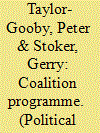

|
|
|
|
|
| Publication |
2011.
|
| Summary/Abstract |
The Coalition programme includes restructuring public provision through reforms and cuts which will take public spending in the Britain below that in the US. This article explores whether the Coalition agenda is best understood as a new approach to Britain's deep-seated economic short-comings or simply as the normal politics of gaining and retaining power. It analyses the current government's programme, identifies the common features across the range of policies and discusses how they are likely to develop as they encounter set-backs.
|
|
|
|
|
|
|
|
|
|
|
|
|
|
|
|
| 10 |
ID:
134099


|
|
|
|
|
| Publication |
2014.
|
| Summary/Abstract |
Since the end of World War II, Japan has relied on the United States for its security, an arrangement enshrined in the US-written Japanese Constitution of 1947 and augmented by subsequent agreements between the two allies. Article IX of the Constitution prohibits Japan from taking part in any conflict or building a traditional military. (When President George H.?W. Bush organized the "coalition of the willing" against Iraq in 1991, Japan was able only to offer financial assistance because of this stipulation.) But with the rise of China and its assertion of sovereignty in regions Japan claims as its own, Tokyo has begun to expand its military capability. Some government officials wonder how these moves will affect relations with the United States, Japan's protector for the last half-century.
|
|
|
|
|
|
|
|
|
|
|
|
|
|
|
|
| 11 |
ID:
145639
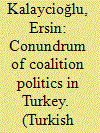

|
|
|
|
|
| Summary/Abstract |
Turkey has had a long track record of coalition governments, yet when the June 7, 2015 general elections produced a hung parliament attempts at establishing a new coalition government failed. Why was this so? This paper argues that the non-compromising attitude of the AKP and the MHP, on the one hand, and, on the other hand, the recalcitrance of the President, who perceived any government he had no firm control over as a threat to his political career, undermined any effort at establishing a coalition government. The terror campaign of the PKK and efforts by the AKP and the MHP to demonize the HDP as the party of terror also undermined the chances of the CHP to form a coalition that included the HDP. Hence, Turkey's chances of establishing a democratic government through compromise failed and the country went back to polarizing politics of competitive authoritarianism under the hegemony of the one-party government of the AKP.
|
|
|
|
|
|
|
|
|
|
|
|
|
|
|
|
| 12 |
ID:
118224
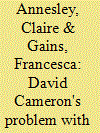

|
|
|
|
|
| Publication |
2012.
|
| Summary/Abstract |
Prior to the election in 2010 David Cameron pledged that his first cabinet would comprise one-third women and would be the most family friendly ever. Since forming the Coalition Government, he appears to have a 'problem' with women. We argue that this problem stems from: the weak representation of women in cabinet and across government; the diminishing resources available to government actors to support gender equality policy; and women's exclusion from the key Coalition networks, both formal and informal, that determine government policy.
|
|
|
|
|
|
|
|
|
|
|
|
|
|
|
|
| 13 |
ID:
133232


|
|
|
|
|
| Publication |
2014.
|
| Summary/Abstract |
Attitudes to quangos are paradoxical. On the one hand they are perceived to be undemocratic, unaccountable organisations, while on the other they are seen to improve effectiveness, limit political interference and increase public confidence in government. This paradox is reflected in the behaviour of political parties, which generally adopt a harsh line towards quangos in opposition, but come to rely on these bodies in office. Ahead of the 2010 general election it was, however, noticeable that the Conservative party rejected this dynamic by promising to pursue 'a more sophisticated approach'. This article explores the Coalition government's subsequent 'public bodies reform programme', assessing its progress against recommendations contained within the Institute for Government's Read before Burning report of July 2010. It concludes that while the Coalition has addressed long-standing concerns about the day-to-day governance of public bodies, it has failed to resolve a set of broader and strategic (metagovernance) issues.
|
|
|
|
|
|
|
|
|
|
|
|
|
|
|
|
| 14 |
ID:
146888
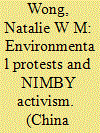

|
|
|
|
|
| Summary/Abstract |
Protests in post-Mao China not only indicate citizens’ increasing dissatisfaction but also challenge the regime to act and take appropriate measures. This article discusses local government response to environmental activism within China’s decentralized political structure. Anti-incinerator protests in Beijing and Guangzhou are used to illustrate the emergence of public participation in municipal policymaking on waste management. The Beijing and Guangzhou governments’ different attitudes and responses to citizens’ grievances are analysed, particularly in light of a new public-consultative waste management mechanism implemented in Guangzhou, the Guangzhou Public Consultation and Supervision Committee for Urban Waste Management (广州市城市废弃物处理公众咨询监督委员会). Changes in policies on waste management and disposal are examined through documentary analysis and in-depth interviews with stakeholders involved in anti-incinerator protests. The main goal here is to demonstrate that policy change is not only determined by protest outcomes, but that it is also greatly affected by the responses of local governments and actors within a framework of advocacy coalition. This study throws new light on Chinese policymaking on environmental issues and it re-appraises studies of environmental management in China.
|
|
|
|
|
|
|
|
|
|
|
|
|
|
|
|
| 15 |
ID:
125896
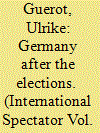

|
|
|
|
|
| Publication |
2013.
|
| Summary/Abstract |
As long as Angela Merkel remains chancellor, most Germans seem to be in no rush to find a coalition. This is why the coalition negotiations have been going on for weeks (and may only conclude when this journal goes to print). Nevertheless, the elections have shaken up the German political landscape: the Liberals (FDP) are out of the Bundestag for the first time since 1949 and the euro-sceptical Alternative for Germany (AfD) is in. With the Left Party still outside of the 'consensus spectrum', the Conservatives (CDU), Social Democrats (SPD) and Greens are the only parties eligible for government in either a grand coalition (CDU/SPD) or a Black-Green coalition (CDU/ Greens). But the SPD's reluctance to enter into a grand coalition a second time, after the disastrous results for the party in 2005-09, led many to hope for an innovative progressive-conservative U-turn in Germany, meaning a Black-Green coalition. Indeed, for a moment it seemed like the CDU and the Greens would dare the impossible after what had been called a "fruitful and harmonious exploration". But in the end, it is going to be a grand coalition again, with the likely effect for Europe that austerity will be softened a bit - but in essence, German European policy will remain as it is, slow and reluctant.
|
|
|
|
|
|
|
|
|
|
|
|
|
|
|
|
| 16 |
ID:
140859
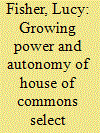

|
|
|
|
|
| Summary/Abstract |
This article is an examination of the rising prominence of House of Commons select committees during the 2010–2015 Parliament, which takes into account the impact of the Wright reforms. The new system of electing committee chairs and members is explored as a central reform that has burnished the autonomy, independence and credibility of the committees. In addition, the characteristics of the coalition government and circumstances entailed by a two-party executive are seen as factors that have made more robust the neutrality of the committees, which have been looked to ever more urgently as impartial scrutineers of government policy and personnel. As the system has been strengthened and received greater attention from the government, the public and the media, select committees have also come to present a platform upon which certain members and chairs have grown their profile. This phenomenon in turn has added to the desirability of roles on committees, which now present an alternative career route to the ministerial ladder.
|
|
|
|
|
|
|
|
|
|
|
|
|
|
|
|
| 17 |
ID:
084523
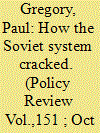

|
|
|
| 18 |
ID:
096259


|
|
|
|
|
| Publication |
2010.
|
| Summary/Abstract |
The return of a hung parliament at the 2010 general election is a serious possibility. But due to Westminster's limited recent experience of parliaments under 'no overall control' there is little institutional memory in Whitehall or Westminster, and even less public understanding, of what the implications would be. This article sets out to analyse the principal challenges that would be faced by government, opposition, parliament and the media in the event of a hung parliament. Drawing on experience from Canada, New Zealand and Scotland, we discuss the difficulties that may arise during the immediate government formation process and in the course of making minority or multiparty governance work on an ongoing basis. We conclude that a hung parliament need not undermine political stability or effective governance, but that all actors would need to adapt their behaviour and should therefore prepare carefully for this eventuality.
|
|
|
|
|
|
|
|
|
|
|
|
|
|
|
|
| 19 |
ID:
123216
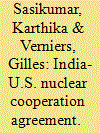

|
|
|
|
|
| Publication |
2013.
|
| Summary/Abstract |
The U.S.-India civil nuclear energy agreement triggered a contentious debate in India from 2005 to 2008. Regional political actors played crucial and unanticipated roles in the debate. We present explanations for the positions adopted by the main actors and the level of contention. We find that parties' positions were driven not by ideology but by the compulsions of coalition politics.
|
|
|
|
|
|
|
|
|
|
|
|
|
|
|
|
| 20 |
ID:
132162
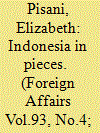

|
|
|
|
|
| Summary/Abstract |
In April, voters in Indonesia's parliamentary elections shocked many observers, confounded most pollsters, and seemed to set back their own long-term interests by failing to deliver a massive victory to the main opposition party, the Indonesian Democratic Party of Struggle. Under the country's complex electoral rules, a party must win 25 percent of the popular vote (or 20 percent of the seats in parliament) before it can formally nominate a presidential candidate. Polls had predicted that the Democratic Party of Struggle would win up to 30 percent of the vote, largely thanks to the massive popularity of the politician the party announced would represent it in the presidential election: Joko Widodo, the governor of Jakarta, who was expected to win that race handily. But his party managed to eke out only 19 percent -- more than any of the 11 other parties in the running, but not enough to cross the threshold. And so Jokowi, as he is widely known, will have to form a coalition to run for president, meaning that if he manages to take the helm of the world's third-largest democracy in July, he'll do so with little power and representing an alliance with no clear platform.
|
|
|
|
|
|
|
|
|
|
|
|
|
|
|
|
|
|
|
|
|